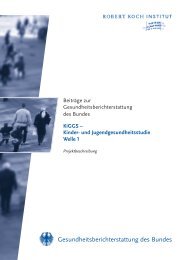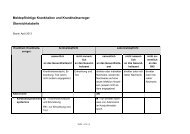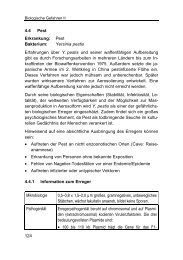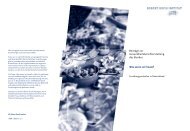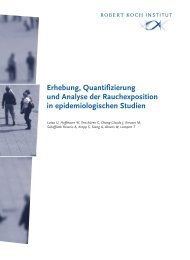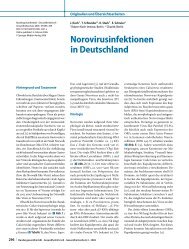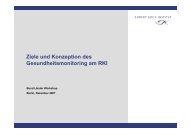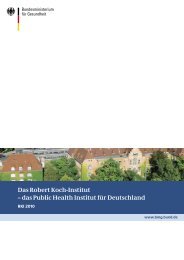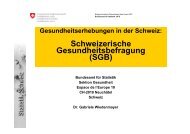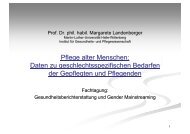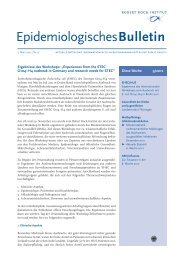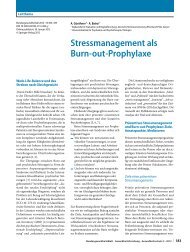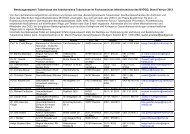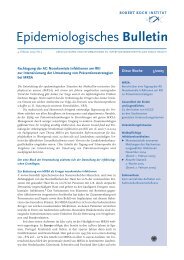Programm des 8. Minisymposiums Xenotransplantation - RKI
Programm des 8. Minisymposiums Xenotransplantation - RKI
Programm des 8. Minisymposiums Xenotransplantation - RKI
Sie wollen auch ein ePaper? Erhöhen Sie die Reichweite Ihrer Titel.
YUMPU macht aus Druck-PDFs automatisch weboptimierte ePaper, die Google liebt.
DAX<br />
Deutsche Arbeitsgemeinschaft für <strong>Xenotransplantation</strong><br />
<strong>Programm</strong> <strong>des</strong> <strong>8.</strong> <strong>Minisymposiums</strong><br />
<strong>Xenotransplantation</strong><br />
Ort: Hörsaal <strong>des</strong> Robert-Koch-Instituts, Nordufer 20, Berlin<br />
Donnerstag, 9. Juni 2005<br />
Festkolloquium zu Ehren von Prof. Dr. Dr. Claus Hammer, München<br />
(mitorganisiert von Prof. Dr. Dietmar Abendroth, Transplantationszentrum, Universität Ulm)<br />
1<strong>8.</strong>00 Laudatio<br />
Prof. Dr. Dietmar Abendroth, Transplantationszentrum, Universität Ulm<br />
1<strong>8.</strong>30 Festvortrag<br />
Transplantation, <strong>Xenotransplantation</strong> und andere Alternativen zum Organersatz<br />
Prof. Dr. Axel Haverich, Klinik für Thorax-, Herz- und Gefäßchirurgie, Medizinische<br />
Hochschule Hannover<br />
19.30 Grußadresse<br />
Prof. Jan Hauss, Klinik für Abdominal-, Thorax- und Gefäßchirurgie<br />
Universität Leipzig, Vorsitzender der DTG<br />
Kurzvorträge<br />
Prof. Dr. Bruno Reichart, Herzchirurgische Klinik der LMU, München<br />
Prof. Dr. Peter Neuhaus, Charité Berlin<br />
20.00 Empfang<br />
Freitag, 10. Juni 2005<br />
<strong>8.</strong>30 Eröffnung<br />
Prof. Dr. Reinhard Kurth, Präsident <strong>des</strong> Robert Koch-Instituts, Berlin<br />
1. Teil: Vorsitz Prof. Dr. Karin Ulrichs, Würzburg<br />
<strong>8.</strong>45 Sichere multitransgene Schweine für die <strong>Xenotransplantation</strong> in Deutschland: ein DFG-<br />
Projekt, Stand 2005<br />
Prof. Dr. Bruno Reichart, Herzchirurgische Klinik der LMU, München<br />
9.15 Physiologische Kompatibilität porciner Nieren bei der <strong>Xenotransplantation</strong><br />
Prof. Dr. Michael Winkler, Klinik für Viszeral- und Transplantationschirurgie,<br />
Medizinische Hochschule Hannover<br />
9.45 <strong>Xenotransplantation</strong>: where do we stand?<br />
MD PhD Dr. Emanuele Cozzi, Department of Medical and Surgical Sciences<br />
ClinicaChirurgica III, Padova, Italy<br />
10.30 – 11.00 Uhr Pause<br />
11.00 Porcine islet cell transplantation<br />
Prof. Dr. Bernhard J. Hering, Diabetes Institute for Immunology & Transplantation,<br />
Department of Surgery, University of Minnesota, Minneapolis, USA (invited*)<br />
12.00 Mittagspause /Pressekonferenz<br />
1
13.15 Diskussion<br />
Stand der <strong>Xenotransplantation</strong> weltweit und internationale Richtlinien<br />
Moderation: Volker Stollorz, Freier Wissenschaftsjournalist<br />
Einleitende Vorträge<br />
American Transplantation Congress 2005: Was ist neu auf dem Gebiet der<br />
<strong>Xenotransplantation</strong><br />
Prof. Dr. Dietmar Abendroth, Transplantationszentrum, Universität Ulm<br />
Die neue Stellungnahme der WHO zur <strong>Xenotransplantation</strong><br />
PD Dr. Ralf Tönjes, Paul-Ehrlich-Institut, Langen<br />
Virologisches Screening der ersten klinischen <strong>Xenotransplantation</strong>en<br />
Dr. Joachim Denner, Robert Koch-Institut, Berlin<br />
2. Teil: Vorsitz Prof. Dr. Dr. Claus Hammer, München<br />
14.15 Die Rolle <strong>des</strong> angeborenen Immunsystems bei der <strong>Xenotransplantation</strong><br />
PD Dr. Joerg Seebach, Transplantationslabor, Universitätsspital Zürich<br />
14.45 Herstellung programmierbarer Zellen als Alternative für embryonale Stammzellen<br />
Prof. Dr. Fred Fändrich, Klinik für allgemeine Chirurgie und Thoraxchirurgie,<br />
Universitätsklinikum Kiel<br />
15.15 Therapie mit embryonalen Stammzellen bei Herzinsuffizienz<br />
Prof. Dr. Wolfgang-Michael Franz, Medizinische Klinik und Poliklinik I, Klinikum der<br />
Universität München-Großhadern<br />
15.45 Differenzierung von Primaten - Stammzellen<br />
Prof. Dr. Ulrich Martin, Leibniz Laboratorien, Medizinische Hochschule Hannover,<br />
16:15 – 16.45 Uhr Pause<br />
3. Teil: Vorsitz Prof. Dr. Bruno Reichart, München<br />
16.45 PERVs: Diagnostik und Hemmung. Auf dem Weg zur sicheren <strong>Xenotransplantation</strong><br />
Dr. Joachim Denner, Robert Koch-Institut, Berlin<br />
17.05 Porzine genetische Fingerabdrücke: PERV-Steckbriefe<br />
PD Dr. Ralf Tönjes, Paul-Ehrlich-Institut, Langen<br />
17.25 Wechselwirkungen zwischen porzinen und humanen Gammaherpesviren<br />
Dr. Bernhard Ehlers, Robert Koch-Institut, Berlin<br />
17.45 Xenogene Inselzelltransplantation<br />
Prof. Dr. Karin Ulrichs, Chirurgische Klinik, Universität Würzburg<br />
1<strong>8.</strong>15 Abschliessende Diskussion<br />
1<strong>8.</strong>30 Ende <strong>des</strong> <strong>Minisymposiums</strong><br />
*) Wenn Prof. Hering der Einladung nicht Folge leisten kann, verschiebt sich das <strong>Programm</strong><br />
um eine Stunde nach vorn<br />
2



